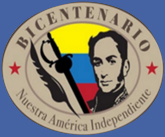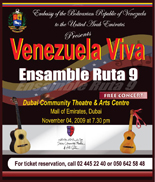
Bolivarian Republic of Venezuela
Embassy in the UAE
Social MissionsCan you imagine living in a country, rich in oil, where the majority of the population can't afford to see a doctor? Throughout Venezuela's history, poor and rural citizens have lacked access to even the most basic health care. But Constitutional Amendments from 1999 made Venezuela the first nation in Latin America to guarantee all citizens the fundamental right to basic health care. More than 60 percent of the population now receive some form of government-sponsored health care, and the results have been inspiring. Between 1996 and 2002, postnatal mortality rates decreased by 38 percent. Today Venezuela has one of the lowest infant mortality rates in Latin America, and is on track to reach the United Nations Millennium Development health goals by 2015. Venezuelans have always enjoyed a substantial wealth because of their status as the world's fifth largest producer. President Hugo Chávez, along with the state-run oil company PdVSA, has affirmed that oil profits that once worked for the benefit of a few will now benefit a few million. International health officials have taken notice. Nils Kastberg, Regional Director of UNICEF publicly acknowledged the achievements this year, commenting, "there is great work taking place in Venezuela to create a space for all children and adolescents and to invest in them, placing them above the political debates." Neiborhood Care: Mission Barrio Adentro The most extensive of Venezuela's health missions programs is called Barrio Adentro ("Inside the Neighborhood") and provides free medical treatment and health education to the country's most depressed regions. Thousands of community-based Health Committees have been established to organize door-to-door surveys of their communities to determine neighborhood needs and develop a comprehensive plan for health improvement. Each week the 20,000 medical professionals that participate in Barrio Adentro will care for more than a million Venezuelans. Since the program was initiated last fall, doctors have conducted close to 40 million consultations. In addition, health professionals have held millions of additional educational activities that focus on preventing high-risk behaviors and improving nutrition. Access to prescriptions: The Sumed Program Venezuela subsidizes a national chain of pharmacies called SUMED (an abbreviation for sumistro de medicos, or distribution of medicine) where subsidized prescription drugs are 30 to 40 percent cheaper than market prices. The program focuses on the accessibility and distribution of essential medications and supplemental vitamins. Victims of AIDS, cancer and chronic diseases receive treatment and medication at no cost. To date more than 4,400 community health clinics offer 129 essential medicines without cost and cover more than 97% of the most common illnesses in Venezuela. Diet and Nutrition: Mission Mercal To confront extreme poverty and hunger, Mission Mercal acts as a network for distributing food and commodities at high quality and low prices. The plan seeks to meet the requirement set by the National Institute for Nutrition of 2600 daily calories per adult. It specializes in reaching out to indigenous and rural communities through mobile markets, or units of trucks that deliver food through rugged terrains, supermarkets that sell food at discounted rates and the investment of $1.3 million US in agricultural infrastructure to assist small and medium-sized farmers. Today, more than 6,000 markets benefit more than 8 million people and distribute more than 3.2 million of kilos of food each day. There are currently 150,000 people in extreme poverty who are now able to eat daily at no cost. A healthier Venezuela No longer are families without access to transportation or financial resources unable to receive proper care-the health care has come to the communities. The programs have aggressively met and exceeded goals by reaching 68% of the Venezuelan population. The programs' successes have been recognized by a number of international institutions, including the World Health Organization, the Pan-American Health Organization and the National Coalition of Doctors. Venezuela's oil wealth, traditionally benefiting a few, is today working on behalf of millions of the country's neediest citizens. |








